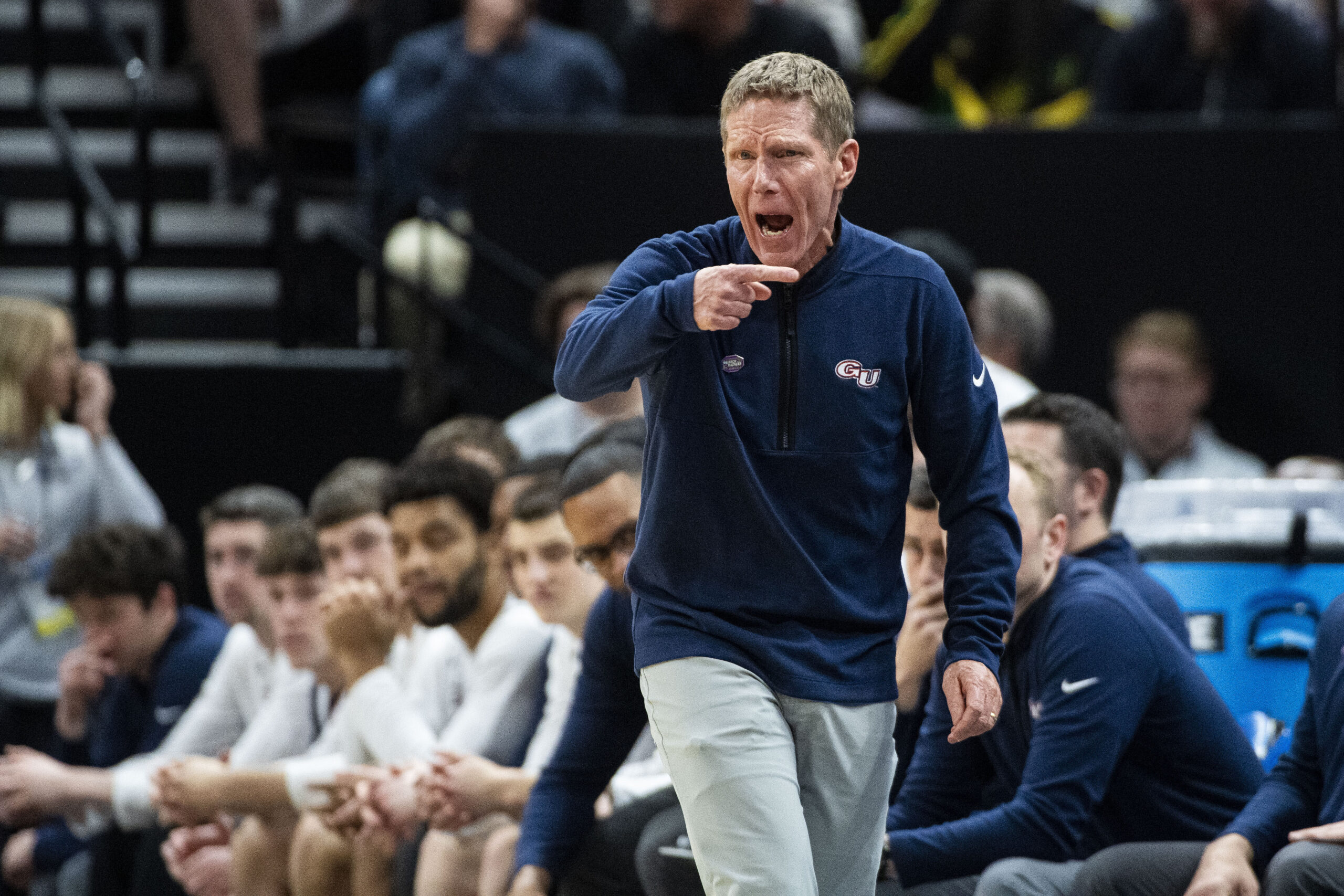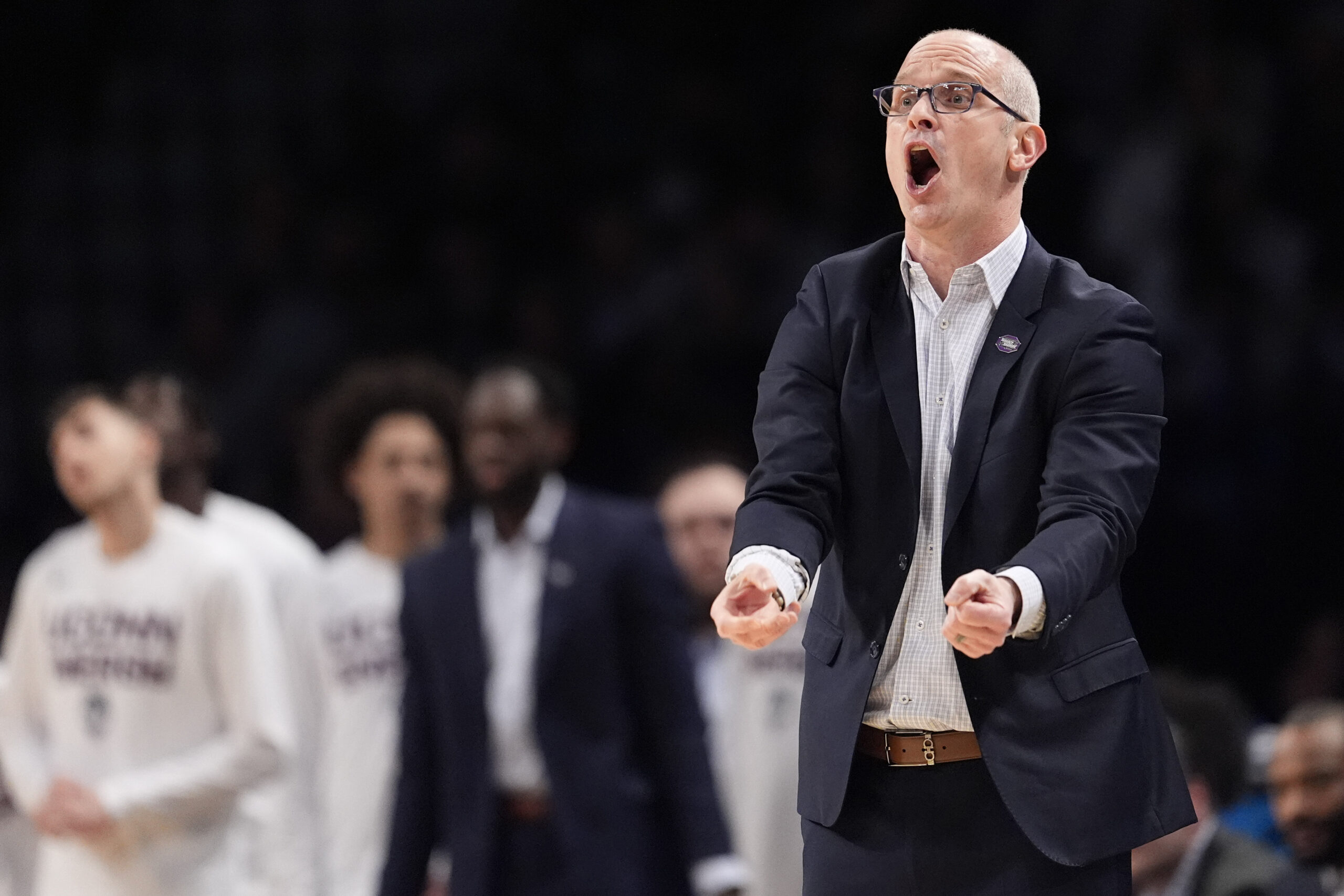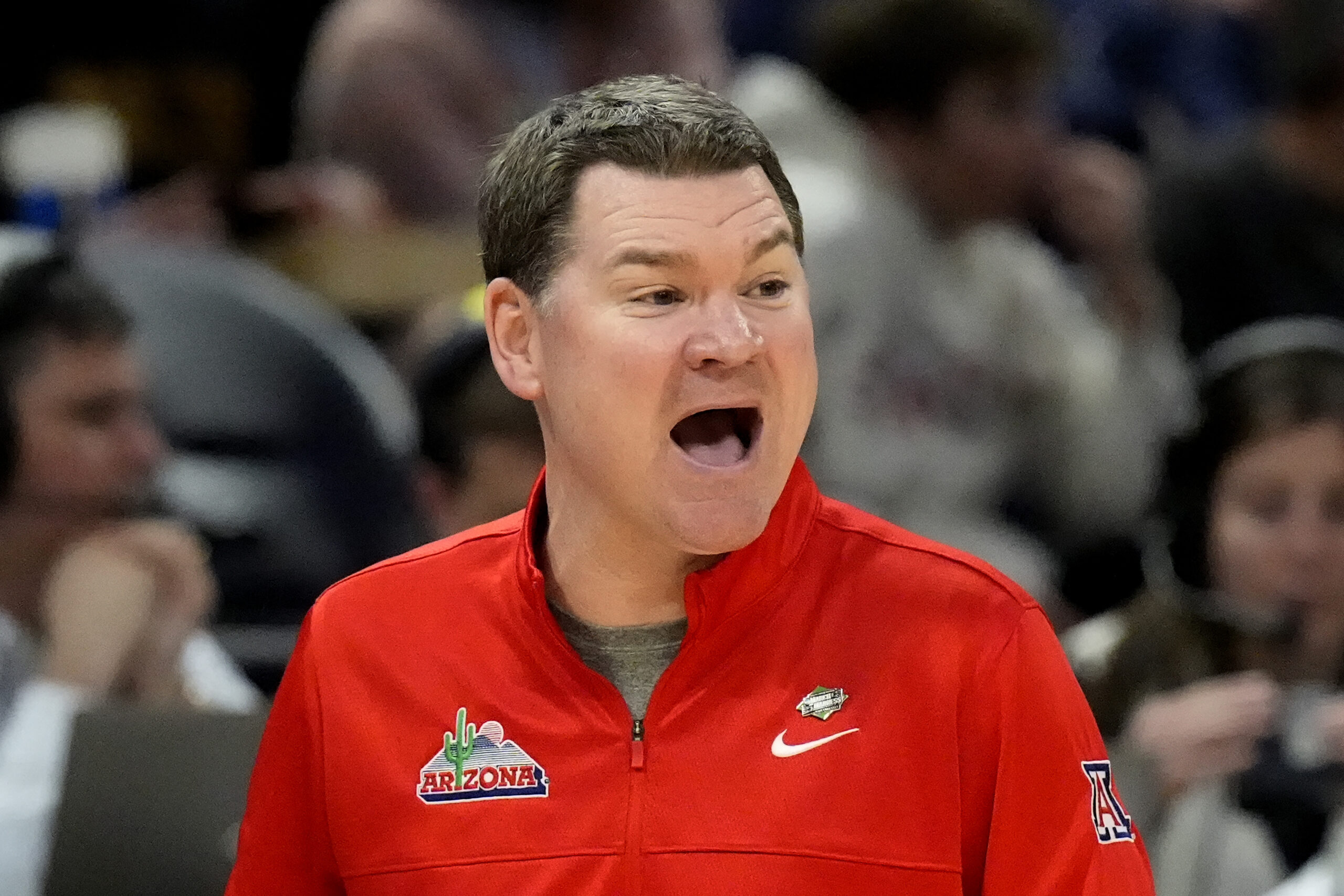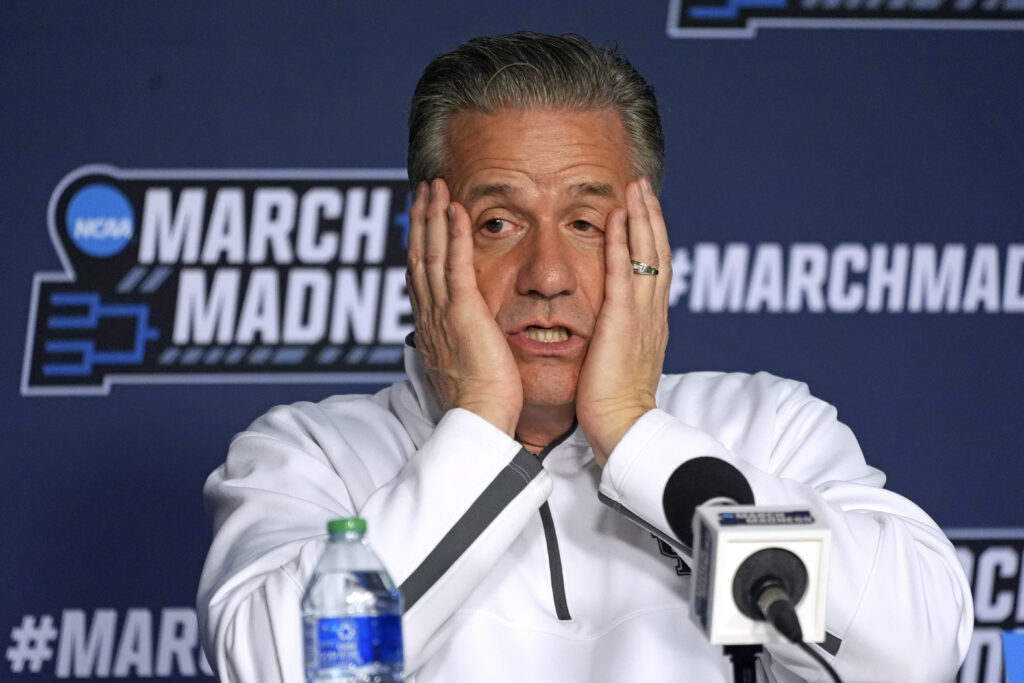Gonzaga reached the Sweet 16 for the ninth consecutive year, the longest active streak in the country, but little about this journey is familiar.
Halfway through the season, the Zags looked more like an NIT team than an NCAA participant. They had just lost at Santa Clara, dropping their record to 11-5 and their NET ranking to No. 46 — otherwise known as bubble territory.
But the Zags righted themselves quickly, ripping off 14 wins in the next 16 games, and comfortably made the March Madness at-large field as the No. 5 seed in the Midwest.
After blasting McNeese State and Kansas by a combined 42 points, the Zags will face No. 1 seed Purdue in the Sweet 16 in Detroit.
 And so we ask: Is this Mark Few’s best coaching job?
And so we ask: Is this Mark Few’s best coaching job?
The bar is undoubtedly high. Few have been honored as the Naismith Coach of the Year twice. He has eight 30-win seasons, two Final Fours, and is a lock for the Hall of Fame.
But in one regard, you could make the case for the 2023-24 season as a tour de Few: It’s only the second time since Gonzaga emerged as a national power that the Bulldogs have reached the Sweet 16 with a seed below No. 4.
The only other instance came in 2016, when they were No. 11 in the Midwest and reached the second weekend before losing to Syracuse.
But that team had a player destined for the lottery portion of the NBA Draft three months later, Domantas Sabonis, and player who would be selected in the draft the following year, Nigel Williams-Goss.
The most striking aspect of this team is the absence of high-end talent. The Zags don’t have a lottery selection. They might not have any players drafted this year or next. Their personnel is solid but not overwhelming.
And yet Few steered the Zags through turbulent waters to a familiar harbor on the second weekend of the NCAAs.
If this isn’t his best coaching job, it’s near the top.
Other winners and losers from the opening weekend …
Winner: Pac-12. Just 48 hours before Selection Sunday, the conference looked destined for two measly NCAA bids. Instead, it earned four and advanced each team to the second round. Add Arizona’s spot in the Sweet 16, and at least 10 tournament units worth $20 million are headed to the conference coffers for Washington State and Oregon State.
Loser: Pac-12. The collective performance by the four participating teams felt more impressive than it was because the bar for the conference is so darn low. In reality, advancing one team to the Sweet 16 is the minimum expected of a power conference. And to all those who believe Oregon and Colorado were seed too low, we’d offer this: The seeds were appropriate based on the regular-season results, but the regular-season results didn’t reflect the talent on either roster.
Winner: Crypto.com Arena. The site of the West regional (formerly known as Staples Center) will host a whopper of an Elite Eight showdown between No. 1 North Carolina and No. 2 Arizona if the teams advance.
Loser: Mountain West. The conference sent a record six teams into the NCAAs but experienced another disappointing showing as four failed to survive the first round. If not for San Diego State, the MW’s name would be mud in March.
Winner: The ACC. The tradition-rich conference was under fire for subpar play throughout the regular season but has emerged from its coma to dominate the tournament with an 8-1 record and four teams in the Sweet 16: North Carolina, Duke, Clemson and N.C. State. Or maybe the ACC wasn’t in a coma. Maybe the critics were just wrong. (The Big East isn’t far behind with a 6-0 and three teams in the Sweet 16.)
Loser: NCAA expansion advocates. SEC commissioner Greg Sankey is perhaps the most vocal proponent of tournament expansion, but he’s hardly alone. (Big 12 commissioner Brett Yormark has waved the expansion banner, as well.) But the performance of mid-level teams from the SEC, Big 12 and Big Ten doesn’t justify the move, especially if it comes at the expense of teams from one-bid leagues.
Winner: TV ratings. A widely-viewed First Four set the stage for huge numbers when the round of 64 began. Sure enough, CBS and the Turner networks delivered the most-watched opening three days in tournament history, with an average of nine million viewers. Oakland’s upset of Kentucky helped attract the eyeballs.
 Loser: Blue bloods. The tournament began without several high-profile basketball schools (UCLA, Louisville, Indiana, Syracuse, and Villanova), then lost Michigan State, Kansas, and Kentucky on the first weekend. Who’s left? Only North Carolina, Duke, UConn, Gonzaga and Arizona.
Loser: Blue bloods. The tournament began without several high-profile basketball schools (UCLA, Louisville, Indiana, Syracuse, and Villanova), then lost Michigan State, Kansas, and Kentucky on the first weekend. Who’s left? Only North Carolina, Duke, UConn, Gonzaga and Arizona.
Winner: N.C. State. The hottest team in the country fended off Oakland in overtime to reach the Sweet 16 for the first time in nine years. The Wolfpack needed five wins in the ACC tournament to qualify for the NCAAs, then won twice over the weekend. Add it up, and they registered seven victories in 12 days. Incredible.
Loser: Kansas. The Jayhawks nearly blew a huge lead in the first round against Samford — they needed help from an egregious officiating call — then were run off the floor by Gonzaga in the second round. Kevin McCullar Jr.’s injury played a significant role in the course of events but doesn’t fully explain a product that was second rate by most standards and third rate by KU standards.
 Winner: Arizona coach Tommy Lloyd. The contract extension announced last month was nice; the victories over Long Beach State and Dayton were better. After the Wildcats’ first-round collapse against Princeton last season, Lloyd needed a Sweet 16 appearance to ward off those skeptical of his ability to navigate March.
Winner: Arizona coach Tommy Lloyd. The contract extension announced last month was nice; the victories over Long Beach State and Dayton were better. After the Wildcats’ first-round collapse against Princeton last season, Lloyd needed a Sweet 16 appearance to ward off those skeptical of his ability to navigate March.
Loser: Kentucky coach John Calipari. The shine was off Calipari’s tenure in Lexington years ago. After the first-round loss to Oakland, rust is now apparent. Big Blue hasn’t reached the Final Four since 2015 and hasn’t survived the opening weekend since 2019. If not for a massive buyout (reportedly $33 million), Calipari would be out of a job.
 Winner: Grand Canyon. The Lopes thumped Saint Mary’s for the first NCAA Tournament win in school history — they have been a Division I program for a decade — then gave Alabama fits for 38 minutes. Look for many more NCAA appearances from Bryce Drew’s program. The school is committed to winning.
Winner: Grand Canyon. The Lopes thumped Saint Mary’s for the first NCAA Tournament win in school history — they have been a Division I program for a decade — then gave Alabama fits for 38 minutes. Look for many more NCAA appearances from Bryce Drew’s program. The school is committed to winning.
Loser: Arizona State. The Sun Devils endured the ignominy of seeing their upstart neighbor, Grand Canyon, go to the second round where they haven’t been in 15 years. Yep, it looks bad. But don’t blame coach Bobby Hurley so much as the institutional indifference toward basketball, which starts at the top with president Michael Crow.
Winner: @YaleMBB. After Yale upset Auburn in the first round, the aforementioned Twitter/X account was inundated with kudos and well wishes. In response, the account posted the following statement: “Our notifications are blowing up with basketball tweets, but we are the Yale molecular biophysics and biochemistry account! You might want to tag @YaleMBasketball instead.”
March is simply the best.
|
ReplyReply allForward
|
Related posts:

(AP Photo/Aaron Doster)
Selection Sunday winners and losers: The West isn’t necessary best, but it’s large (in representation)
(AP Photo/Ralph Freso, File)
Pac-12 football strategy: With playoff expansion secure, conference to revisit divisions, champ game format and schedule model Pac-12 top 10: Key players return for Utah and Washington, a Big Ten exit, a USC legend passes and other top stories from the week
Pac-12 top 10: Key players return for Utah and Washington, a Big Ten exit, a USC legend passes and other top stories from the week

(AP Photo/Ralph Freso, File)
Pac-12 Networks financial mess: The partner in question, annual revenue numbers, Scott lays low and more on the timelineJon Wilner
Jon Wilner has been covering college sports for decades and is an AP top-25 football and basketball voter as well as a Heisman Trophy voter. He was named Beat Writer of the Year in 2013 by the Football Writers Association of America for his coverage of the Pac-12, won first place for feature writing in 2016 in the Associated Press Sports Editors writing contest and is a five-time APSE honoree.
